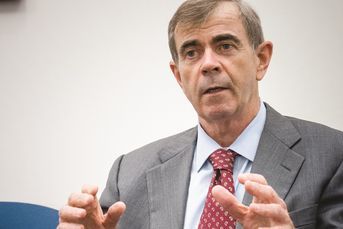Wirehouses seen winning in DOL’s final fiduciary rule
 John Thiel, head of Merrill Lynch Wealth Management
John Thiel, head of Merrill Lynch Wealth Management
Brokers may continue selling higher-cost proprietary products if they meet certain conditions.
Concessions in the final version of the Department of Labor’s fiduciary rule will allow Wall Street brokerage firms to continue to sell proprietary products, something they originally feared they may no longer be able to do.
Secretary of Labor Thomas Perez released the revised rule Wednesday requiring advisers to act in the best interests of investors when providing investment advice for their retirement accounts. They’ve also gained an additional four months to implement the rule, with the DOL now giving them a full year.
The revised rule clarifies how a financial institution that limits its offerings to proprietary products can satisfy the best interest contract exemption, known as BICE. Essentially, they have to let investors know what commissions they’re charging.
“We are pleased that Secretary Perez and the Department of Labor staff have worked to address many of the practical concerns raised during the comment period,” John Thiel, head of Merrill Lynch Wealth Management, said in an emailed statement.
”As we study the details of the final rule, we hope to continue what has been a constructive dialogue with the department about how to implement a best interest standard effectively and efficiently for the benefit of our clients, advisers and shareholders,” he said.
The long-awaited regulation means brokers will have to disclose commissions they reap from sales of investment products to investors saving for retirement, leaving it up to investors to read the communication of those details, according to Ken Fisher, founder of Fisher Investments, one of the largest registered investment advisers in the U.S.
“The strength of this is in the disclosure,” he said. “The weaknesses are everywhere else.”
The final version of the rule leaves room for “potential abuses” given that high-fee investments such as annuities that benefit brokers can still be sold into retirement accounts, according to Mr. Fisher. Investors who take heed of the required disclosure “will be mightily armed,” he said.
Brokers who comply with the fiduciary rule by informing clients in an email that they’re choosing to be paid commissions may continue to benefit from higher-cost proprietary products, particularly if the investors don’t bother to read the notification, according to John Anderson, head of practice management solutions at SEI Advisor Network.
That’s a win for the wirehouses, he said, as it “allows them to sell their internal products in a much easier way than in the original way the rule was written.”
Still, individuals will now have the disclosure requirement to lean on should a dispute arise about whether a broker is complying with the new rule, according to Mr. Fisher.
“It’s a step in the right direction,” he said. “Regulation can’t be perfect.”
With the list of approved investment products for retirement accounts removed, effectively allowing any type of investment to theoretically be sold, the final rule also clarifies that the best interest contract exemption doesn’t have to be signed until an account is opened. While firms will have a full-year for initial implementation, full compliance won’t be required until Jan. 1, 2018.
While it will take time to analyze all the final details, Morgan Stanley has been planning for the fiduciary rule since it was initially proposed by the Labor Department, according to Christine Jockle, a spokeswoman.
The firm is “making investments in the systems and technology that will enable us to offer compliant solutions to clients whose retirement accounts are affected,” she said in an emailed statement. “Putting clients’ interests first is a core value of Morgan Stanley.”
Wells Fargo, which has plan in place for reviewing the final rule, “has long supported a best interest standard and believes that professional financial advisers have a crucial role to play in encouraging retirement saving and investing,” Tony Mattera, a spokesman for the firm said in an emailed statement.
Gregg Rosenberg, a spokesman for UBS, declined to comment as the rule was still under the firm’s review.
Learn more about reprints and licensing for this article.






